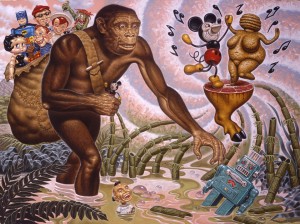APRIL 14, 2014 * 100-104 McKenna Hall

Title: The Hunter Gatherer
The Notre Dame Institute for Advanced Study (NDIAS) invites you to to participate in “The Invisible Aspects of Human Evolution,” a Templeton Colloquium being offered being offered at the University of Notre Dame by Dr. Jonathan Marks, Professor of Anthropology at the University of North Carolina, Charlotte. Dr. Marks is in residence this year as a Templeton Fellow at the NDIAS.
There is no registration, and the colloquium is free and open to the public.
This colloquium brings together scholars from various fields and perspectives in anthropology to discuss the transformation of an anatomical human into a behavioral human, which seems to have taken place between about 100,000 and 50,000 years ago, a timespan notably impoverished of data, but whose eventual products would become art, kinship, morality, religion, and the myriad other features of what we call “humanity.” Some scholars have postulated an invisible, unknown genetic mutation lying at the root of this transformation, rendering a deus ex machina explanation. However, as other scholars have suggested, these humans existed at the origin of a great learning curve. Although biologists and evolutionary psychologists have reduced the origin of morality and religion to altruism and cooperation, morality and religion more likely emerged from the classic anthropological domains of the sacred, the profane, and the taboo. In this colloquium, participants will be asked to confront these ideas and to discuss the origins of human intellectual and social life that constitute the transformation of an anatomical human person into a human being, or perhaps into a human “becoming.”
The sessions will take place in 100-104 McKenna Hall and will also be simulcast live. If you wish to participate, we encourage you to review the pre-circulated paper on evolution written by Jonathan Marks.
This colloquium is sponsored by the Notre Dame Institute for Advanced Study, with generous funding from the John Templeton Foundation.
Digital Colloquium Schedule
Colloquium Poster
Monday, April 14
•9:00 am “The Origin of Language,”
•10:45 am “The Origin of Kinship,”
•2:00 pm “The Origin of Religion,”
•3:45 pm Question & Answer Session